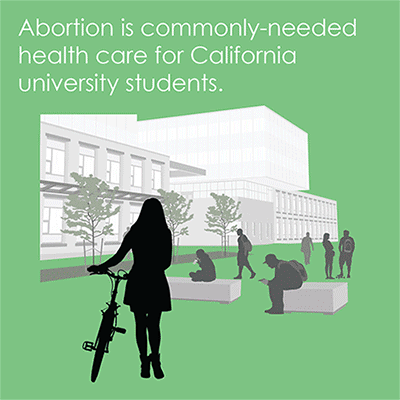 California SB 24, also known as the College Student Right to Access Act, would expand medication abortion access on California State University (CSU) and University of California (UC) campuses.
California SB 24, also known as the College Student Right to Access Act, would expand medication abortion access on California State University (CSU) and University of California (UC) campuses.
ANSIRH conducted two studies to estimate the demand for medication abortion among students, and understand the barriers students currently face seeking abortion off-campus (see detailed results here), and to evaluate whether student health centers have the capacity to provide medication abortion services on campus (see detailed results here). Results were also included in our policy briefs, Assessing barriers to medication abortion among California’s public university students, and Evaluating University of California (UC) and California State University (CSU) capacity to provide medication abortion, which were shared with legislators.
What is the demand for medication abortion on California college campuses?
An estimated 322 to 519 UC and CSU students seek medication abortion each month in California. Currently, the majority of students have to travel at least 30 minutes each way using public transportation to reach the nearest facility offering abortion care. Given that medication abortion requires two visits to an off-campus provider, each with travel to and from the facility, most students (62%) would need to spend 2 hours or more on public transit to access abortion. For some students, this travel time is as much as four or six hours. (More than two-thirds of UC students and one-third of CSU students do not have a car.)
Also, students have to wait one week, on average, for the next available medication abortion appointment and most nearby facilities are not open on weekends. Having to seek care off-campus may therefore lead to delays in care and interruption in coursework. Delays can make a student ineligible for early medication abortion, increasing the costs of care. Student health centers have the potential to offer medication abortion at a lower cost than what is currently charged out-of-pocket at off-campus facilities.
Results of this study were published in the Journal of Adolescent Health. For a summary of the study see our policy brief.
Do student health centers have the capacity to provide medication abortion on college campuses?
In California, any trained physician or advanced practice clinician can provide medication abortion care. The provider must be able to assess pregnancy duration, diagnose ectopic pregnancy, and provide surgical intervention if needed (either personally or through referral). Facility and equipment requirements are also minimal. They include a private exam room, speculums and adequate lighting, an ultrasound machine (or referral) if used to assess gestational duration, access to a laboratory for testing (or referral), and a 24-hour telephone hotline staffed by clinicians.
ANSIRH researchers concluded that it would be feasible for UC and CSU student health centers to provide medication abortion care on campus, based on an assessment of the current services provided by and resources available at the health centers. All UC and CSU student health centers provide primary care services, including basic sexual and reproductive health care and contraception. Most health centers are already set up with the physical space to provide medication abortion and the ability to diagnose pregnancy and counsel about pregnancy options, and all UCs are already equipped with an after-hours triage platform. The UC student health insurance program (SHIP) covers abortion care, and all UC students are required to have health insurance either through SHIP or another insurer. Visiting clinicians and telemedicine programs could support student health centers in providing medication abortion care, particularly at centers that have a limited provider capacity.
An estimated 36% of abortions in the US are performed at nonspecialized clinics, including primary care or family medicine clinics. Patients have indicated high satisfaction and appreciation of the privacy, convenience and continuity of care afforded by accessing abortion in their usual primary care setting. Student health centers represent another primary care site where abortion care could be offered. In improving access to medication abortion services on campus, California could be a model for the rest of the country.
Results of this study were published in Contraception. For a summary of the study see our policy brief.
What are the main takeaways from this research?
A summary of our findings can be find in our two-page brief, "Medication Abortion Access at California Public Universities."
